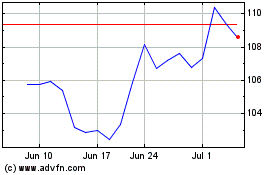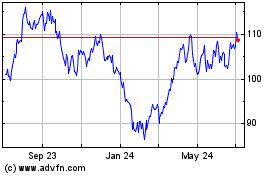By Paul Page
Sign up: With one click, get this newsletter delivered to your
inbox.
The world's big grain processing companies are having a hard
time digesting the global glut in agriculture commodities. Grain
trading and processing giants Archer Daniels Midland Co. and Bunge
Ltd. are slashing hundreds of millions of dollars in spending and
restructuring their operations, the WSJ's Jacob Bunge and Jesse
Newman write, as they navigate a world awash in corn, soybeans and
wheat. Several years of bumper crops in markets across the globe
have kept grain prices low, upended traditional farm-sector
dynamics and roiled supply chains. Farmers are storing grain rather
than sell it to grain companies at low prices, and some food
companies are placing fewer long-term orders since prices are
expected to stay cheap. That's squeezing financial returns at
trading companies like ADM, Bunge and Cargill Inc., and hitting
agriculture suppliers. Fertilizer giant Mosaic Co. is idling a
Florida plant as it grapples with an oversupply of crop nutrients,
and farm cooperative CHS Inc. recently agreed to sell its Canadian
retail locations.
Truckers are getting more confident than ever in the U.S.
freight economy. Fleet owners ramped up orders for new heavy-duty
trucks to the highest level in nearly three years, WSJ Logistics
Reports Jennifer Smith writes, ordering 36,200 Class 8 trucks in a
bullish start to the busiest part of the ordering season. ACT
Research says the busiest month for big-rig orders since December
2014 likely signals even stronger orders in coming months. Truckers
are glowing over robust demand and stronger prices for shipping
services to go along with it. Truckload operator Werner Enterprises
Inc. recently reported a 19% increase in third-quarter profit that
was helped by a 3.4% gain in average revenue per mile -- the sort
of increase many truckers now are trying to build into higher
contract rates. The orders also provide a long-awaited boost to
truck and engine makers that will pump up factory operations that
were pulling back just a few months ago.
Growing use of consumer data is helping drive bigger gains in
online sales at Alibaba Group Holding Ltd. The Chinese e-commerce
giant more than doubled its net profit to $2.7 billion in a
blockbuster second quarter, the WSJ's Liza Lin at and Maria
Armental report, on a 61% gain in overall revenue and 63% more
revenue from core online commerce. The gains suggest the
integration of retail technologies is bringing more information
that helps Alibaba tailor its buyer home pages to spur sales. The
rising sales volume should be a boon to its logistics operation as
Alibaba works with that business, Cainiao, after increasing its
stake to a majority holding this fall. The Cainiao losses rose last
quarter to $41 million, a slim amount given Alibaba's $8.3 billion
in overall revenue. Like U.S. competitor Amazon.com Inc., the
company also is investing in physical stores, and those are likely
to figure more prominently in its development of logistics and data
in the coming year.
ECONOMY & TRADE
Tensions over ongoing trade between the U.S. and Canada are
growing just as the countries are trying to reset the map for the
movement of goods across North America. The U.S. is launching big
tariffs on imports of softwood lumber from Canada, the WSJ's
William Mauldin and Paul Vieira report, bringing back to the
forefront one of several targeted disputes buffeting relations
between the countries while they renegotiate Nafta. The lumber
dispute, a similar tariff fight over Bombardier Inc. jets made in
Canada, and a disagreement over milk products have dominated
business headlines in Canada this year, raising concerns that the
trade friction could spill over into broader bilateral ties. The
lumber tariffs, if they are permanently imposed, will a duty of
around 20% or more on shipments from Canada, depending on the
Canadian mill. That's lower than expected, however, and futures
prices for lumber fell after the announcement from a more than
two-decade high.
Blue Apron Holdings Inc. is having trouble fulfilling customer
orders and investor expectations. The meal-kit delivery company
more than doubled its net loss in the third quarter to $87.2
million, the WSJ's Heather Haddon reports, amid signs that the
fulfillment operations at the heart of its business are growing
costlier and slower. The company that made a splash with its
initial public offering this summer is facing growing competition
in the burgeoning food-delivery field, including service expansion
at grocery stores that have bigger scale and are closer to
consumers. Blue Apron is trying to offer more products and
flexibility to its subscription service, but a shift to a new
facility drove its costs up by 86% last quarter even as the
company's number of customers shrank. The company and competitors
like HelloFresh and Plated have drawn consumer interest to a new
business, but the results suggest they're still working on a
profitable logistics recipe.
QUOTABLE
IN OTHER NEWS
The Bank of England raised its benchmark interest rate for the
first time in a decade. (WSJ)
U.S. worker productivity improved in the third quarter at the
best rate in three years. (WSJ)
Rising iPhone demand and double-digit growth in iPad and Mac
shipments pushed Apple Inc.'s quarterly net profit up 19% to $10.71
billion. (WSJ)
Online-furniture retailer Wayfair Inc. reported a
steeper-than-expected $76.4 million quarterly loss on rising
marketing and operations costs. (WSJ)
Bombardier Inc.'s third-quarter net loss expanded as it prepared
for its new partnership with Airbus SE. (WSJ)
Etihad Airways pared its U.S. services after American Airlines
Group Inc. ended a passenger cooperation agreement with the
airline. (WSJ)
Tesla Inc. Chief Executive Elon Musk says its car production
will start in China in 2019 at the earliest. (WSJ)
Driverless-car business Waymo LLC signed AutoNation Inc. to
service robovans being tested in Arizona and California. (WSJ)
Starbucks Corp. is selling its Tazo tea business to Unilever
PLC. (WSJ)
Personal-computer maker Lenovo Group Ltd. agreed to buy a
controlling stake in a unit of Japan's Fujitsu Ltd. (WSJ)
DowDuPont Inc. will reduce its global workforce and shut assets
to help reach a $3 billion cost-savings goal. (WSJ)
Commissioners at the ports of Los Angeles and Long Beach
approved a plan to slash air pollution by phasing out diesel
trucks. (Los Angeles Times)
U.S. midwest grocer Hy-Vee Inc. is resetting its supply chain
expansion to focus on fulfillment operations for online shopping.
(Des Moines Register)
CSX Corp. dropped plans to expand a tunnel to improve cargo
transport connected to the Port of Baltimore. (Baltimore Sun)
Amazon is in advanced talks to cooperate on deliveries with
Australia Post. (Daily Mail)
India is considering rules that would allow deliveries by drone.
(Economic Times)
France's Marseille port will build a 750,000-square-foot
logistics center near its container terminals. (Lloyd's Loading
List)
Container ship owner Danaos Corp. does not expect "material
improvement" in the charter shipping market next year. (The
Loadstar)
The vessel-owning arm of Japanese shipyard Imabari Shipbuilding
will double the size of its container ship fleet. (Splash 24/7)
Agriculture suppliers began the first avocado exports from
Colombia to the U.S. (Fresh Plaza)
DistributionNow's third-quarter sales jumped 34% on stronger
demand in energy markets. (Industrial Distribution)
Nevada is investigating allegations that a transportation
employee who tests workers for substance abuse was selling
moonshine on the job. (Las Vegas Review-Journal)
ABOUT US
Paul Page is deputy editor of WSJ Logistics Report. Follow him
at @PaulPage, and follow the entire WSJ Logistics Report team:
@brianjbaskin , @jensmithWSJ and @EEPhillips_WSJ. Follow the WSJ
Logistics Report on Twitter at @WSJLogistics.
Write to Paul Page at paul.page@wsj.com
(END) Dow Jones Newswires
November 03, 2017 06:40 ET (10:40 GMT)
Copyright (c) 2017 Dow Jones & Company, Inc.
Bunge Global (NYSE:BG)
Historical Stock Chart
From Mar 2024 to Apr 2024

Bunge Global (NYSE:BG)
Historical Stock Chart
From Apr 2023 to Apr 2024
